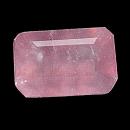|
|
||||||||||||||||
|
||||||||||||||||
|
||||||
|
|
|
|
Ussingite
|
|
| | |
| DDiscovered in 1914; IMA status: Valid (pre-IMA; Grandfathered) | ||
|
| ||
|
Chemistry |
|
|
| |
|
Na2AlSi3O8(OH) | |
|
|
Sodium Aluminum Silicate Hydroxide |
|
Molecular Weight: |
302.22 gm |
|
Composition: |
Sodium |
15.21 % |
Na |
20.51 % |
Na2O |
|
|
Aluminum |
8.93 % |
Al |
16.87 % |
Al2O3 |
|
|
Silicon |
27.88 % |
Si |
59.64 % |
SiO2 |
|
|
Hydrogen |
0.33 % |
H |
2.98 % |
H2O |
|
|
Oxygen |
47.65 % |
O |
|
|
|
|
|
100.00 % |
|
100.00 % |
= TOTAL OXIDE |
|
|
|
||||
|
Classification |
|
|
| |
|
Silicates (Germanates) | |
|
8/J.14-10 | |
|
|
9 : SILICATES (Germanates)
|
|
Varieties: |
None |
|
Synonyms: |
ICSD 6265, PDF 28.1037 |
|
|
|
|
Crystal Data |
|
|
|
|
|
Rarely as pseudocubic to tabular crystals, to 1 cm; fine-grained, compact. |
|
|
Common on [010] |
|
|
|
|
|
Physical Properties |
|
|
|
|
|
Perfect on {110} |
|
|
Irregular/Uneven |
|
|
Brittle |
|
|
6.0 - 7.0 |
|
|
2.457 - 2.490 (g/cm3) |
|
|
None |
|
|
Not Radioactive |
|
|
|
|
|
Optical Properties |
|
|
|
|
|
Pale pink, lilac-blue, or dark violet-red, may be tarnished on the surface; colorless in thin section. |
|
|
Transparent to Translucent |
|
|
Slightly greasy to vitreous; slightly pearly on cleavage planes. |
|
|
1.503 - 1.545 Biaxial ( + ) |
|
|
0.041 |
|
|
None |
|
|
None |
|
|
|
|
|
Occurances |
|
|
|
|
|
Geological Setting: |
A secondary mineral in pegmatites associated with sodalite syenite (Ilímaussaq intrusion, Greenland); in sodalite xenoliths in an intrusive alkalic gabbro-syenite complex (Mont Saint-Hilaire, Canada). |
|
Common Associations: |
Microcline, Natrolite, Aegirine (Ilímaussaq intrusion, Greenland); Natrolite, Aegirine, Microcline, Albite, Sodalite (Lovozero massif, Russia); Villiaumite, Lovozerite, Eudialyte, Lueshite, Griceite, Natrophosphate (Mont Saint-Hilaire, Canada). |
|
Common Impurities: |
Ca, K, Cl, H2O, S |
|
Type Locality: |
Kangerdluarssuq Firth (Kangerdluarssuk; Kangerdluarsuk), Ilimaussaq complex, Narsaq, Kitaa Province (West Greenland), Greenland |
|
Year Discovered: |
1914 |
|
View mineral photos: | |
|
|
|
|
More Information |
|
|
|
|
|
| |
|
|
|
|
Ussingite is
found in three localities: southern
Greenland, on the Kangerdluarssuk Plateau, in the Ilimaussaq
intrusion; from a number of places in both the Lovozero
and Khibiny massifs, Kola Peninsula, Russia; Mt. Mont
Saint-Hilaire, Quebec, Canada. It is most abundant in the Illimaussaq
intrusion around the Kangerdlussaq area of southern
Greenland. |
|
|
We
have not photographed our Ussingite
gems. Please
check back soon. |
